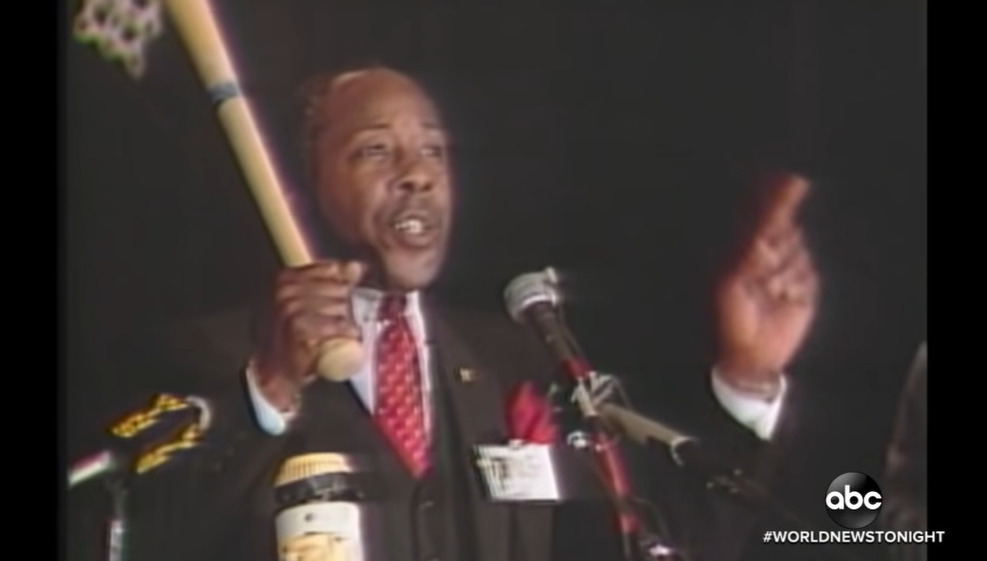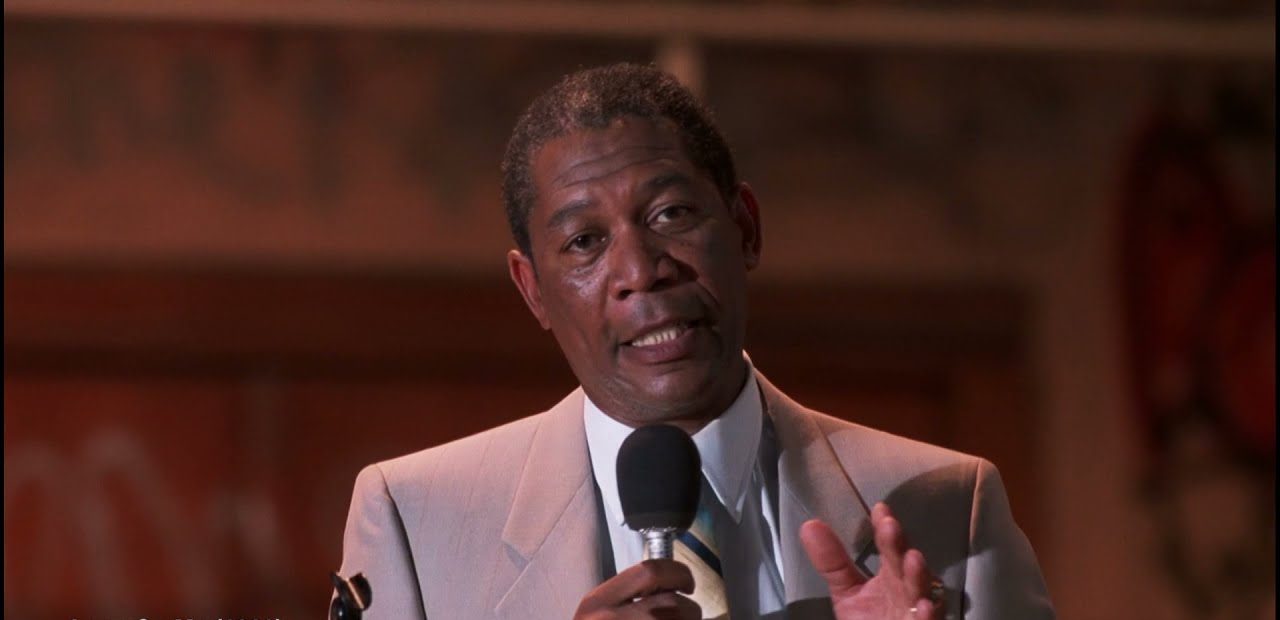Directed by John G. Avildsen, ‘Lean on Me’ is a classic inspirational drama film that captivates its audience with its portrayal of a high school’s struggle. Led by Morgan Freeman as Principal Joe Clark, the 1989 film delves into the challenges faced by a troubled school and its transformative journey. When the East Side High School, plagued by drugs, violence, and academic underachievement, is on the brink of closure, former teacher Clark decides is called in to step into the role of the Principal and make radical changes.
Throughout the movie, we see Clark implement a series of bold and often unconventional methods to address the issues afflicting the school with the aim of restoring the educational institution’s lost glory. The troubling condition of the school seems like a reflection of the socio-economic challenges urban schools faced at that time. But how, if at all, real are the story and its characters? We wanted to separate fact from fiction, and this is what we found!
Lean on Me is Based on the True Story of Principal Joe Clark
‘Lean on Me’ is based on a true story. Driven by a script penned by Michael Schiffer, the film takes inspiration from the life and works of Joe Louis Clark, a real-life educator at Eastside High School in Paterson, New Jersey. He faced the daunting task of saving the school from academic and social collapse. Considered to be a real hero to thousands of students, Clark managed to bring order to a chaotic, inner-city school. For his work, he was profiled by ‘60 Minutes’, interviewed on ‘Nightline’, and even praised by former President Ronald Reagan.

In the film, Principal Joe Clark takes on an unorthodox and sometimes controversial approach to discipline students and expel troublemakers. As per reports, the real-life story is not that far from fiction. Known for his no-nonsense attitude, Clark’s commitment is what led to improved academic standards and the school’s environment. His strict enforcement of discipline, including expelling troublemakers and even chaining the school’s front doors to lock out drug dealers, garnered praise as well as controversy.
Clark’s tenure was accompanied by a surge in standardized test scores and a decrease in violent incidents, leading to an improved school image. However, not everyone in the Eastside High School community supported his methods. Some of them criticized his authoritarian approach and even tried to take him down. The characters in ‘Lean on Me’ are vividly etched, each with their unique struggles and triumphs, contributing to the film’s emotional resonance. Joe Clark, the heart of the film, played by none other than Morgan Freeman, is a fearless and unyielding force of change.

Freeman’s portrayal perfectly encapsulates the character’s unwavering resolve, charisma, and belief in the potential of his students. From his mannerisms to his delivery, the actor managed to mirror the bullhorn-toting and baseball-bat-wielding Principal to the T. Meanwhile, the character of Ms. Levias (Beverly Todd) highlights the dilemmas and challenges dedicated teachers face while working within a struggling educational system. At the same time, Thomas Sams (Jermaine Hopkins) displays the transformation that education can bring to a troubled student.
Needless to say, the ensemble cast collectively reflects the complex interplay between mentorship, discipline, and the pursuit of a brighter future for young souls of the country. Academy Award director John G. Avildsen was no stranger to crafting films that deeply resonate with audiences. With successes like ‘The Karate Kid’ and ‘Rocky‘ to his credit, he possessed a knack for creating films that portrayed the triumph of the human spirit over adversity. In ‘Lean on Me’, Avildsen deftly navigated the balance between cinematic engagement and raw realism. In fact, most of the students we see on screen are actual students from either Eastside High or nearby schools.
While Avildsen took inspiration from real events for the film, he also took certain creative liberties to enhance its dramatic impact. The film amalgamates characters, condenses timelines, and exaggerates certain events for storytelling purposes. As per Los Angeles Times, in the film, Clark expels 300 students in a single day for being drug users and dealers. In reality, during Clark’s first two months at Eastside High, 135 students were asked to leave either because of poor grades or poor attendance. By the end of the year, this figure reached 300, as more students were removed from the school’s rolls for a multitude of violations mostly related to attendance.
One of the furthest deviations from reality has to be the portrayal of Caucasians. In the movie, the mayor conspires with an angry parent to set a trap for Clark. The truth is that the Caucasian mayor at the time, Frank X. Graves Jr., was one of the first few who rallied behind the Principal. Shedding light on the same, Clark said, “Some of my greatest supporters are white. The mayor is off. Paterson’s mayor was much more supportive.” He further revealed that the film is “95% accurate,” saying, “I wanted no sex, and no swearing, because I don’t talk that way. They did those things.”
Upon being asked why he didn’t show any apprehension about certain deviations from real life, like the inclusion of the scene where the Principal’s wife leaves him, Clark said, “Because I go by instinct. And because I believed in Norman Twain’s honesty and integrity, and because I had a very good rapport with the writer and director. So I never had any confrontations about what should and should not be in the movie.” Lastly, he added, “I wanted a true depiction of me. Now I admit some situations call for a Mother Teresa. But I’m more of a Dirty Harry kind of guy. So when I’m portrayed as being ornery, obdurate, rebellious, irascible and especially adversarial, it’s absolutely right.”
After leading such an interesting life that had such an impact on the educational sector, Joe Louis Clark passed away on December 29, 2020, in Florida, after a tough battle with a prolonged illness at the age of 82. Overall, the way Avildsen blended the real-life personalities and events with the reel ones is a testament to the way biographical films tell a coherent story within a limited runtime. However, the film did face certain criticism for its portrayal of Joe Clark and the overall situation at Eastside High School.
Some critics argue that the film glorifies Clark’s authoritarian approach and oversimplifies the complexities of turning a failing school around. As viewers, we can appreciate ‘Lean on Me’ for its portrayal of an educator’s remarkable journey while also acknowledging the broader complexities that might not have been fully captured. Ultimately, the enduring legacy of the film lies in its ability to spark conversations about education reform and the potential for positive change in even the most challenging circumstances.
Read More: Most Inspirational Movies of All Time


You must be logged in to post a comment.